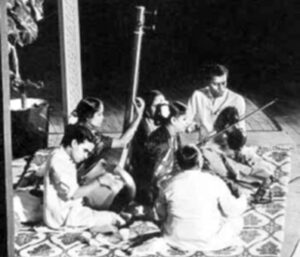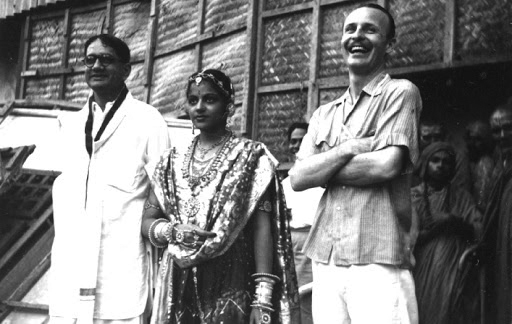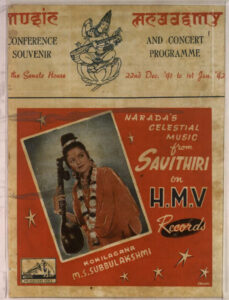Registered with the Registrar of Newspapers for India under R.N.I 53640/91
Vol. XXXI No. 17, December 16-31, 2021
Season Special: The Genius of M.S. Subbulakshmi
by Murari

MS Subbulakshmi performing at the UN, pic courtesy The Hindu.
OCTOBER 25, 1986. A day to remember in Delhi, the cradle of all cultures. The music lovers of Delhi rose to a person to applaud the Queen of music after her performance to raise funds for the S.K. Bose Memorial Trust where she was also presented the Spirit of Freedom Award. The next day I go to meet her after she has graciously agreed to talk to me on certain aspects of the current status of Carnatic music in India. It was a mellow autumn morning and on the Sun dappled and well manicured lawns of the Vice-President’s residence we met her. We are thrice blessed since her friend, philosopher and one who has guided her destinies since 1940, her husband Sadasivam is there alongwith her Guru, the doyen of Carnatic music, Semmangudi Srinivasa lyer, who was responsible for honing and polishing her already near perfect music, before she went to him as his Sishya.
Madurai Shanmugavadivu Subbulakshmi, MS as she is known all over the country, Kunjamma as she is affectionately known to her close coterie of friends and the family, is indisputably the reigning queen of music whose mellifluous voice acts as a soothing balm to tired minds, with an infinite capacity to instantly establish a unique rapport with her listeners towards achieving total audience participation. Some become legendary figures, some are hailed as prodigies or as phenomena in the field of music but few have attained the pinnacle of glory as MS has done in the last five decades. Honours and awards have been heaped on her; but these have not changed the intrinsic traits of her personality. Through all the honours, praise and adulation, she has remained humble and self-effacing. She has expressed her serene feelings through the ethereal language of music to be used solely in praise of the Lord and expressing the facets of human destiny seeking the highest aspirations. Blessed is the one who can attune the inner ears to comprehend the divine message inherent in such music, so subtly conveyed in moments of ecstasy by this modern ‘Nightingale of India”.
By this God given gift of her music, MS has constantly striven to remind mankind that music has the power to lift human beings out of their environs to the ecstatic state of bliss. For nearly five decades, she has enthralled the lay and the learned alike. Her music evokes emotions and feelings which provide content and meaning to life itself. Can this be explained in concrete terms? I am afraid not. It can only be experienced. Her golden voice, cascades of melody, with its power diverts the mind from a futile chase of transient pursuits and channelises it into nobler paths. What is the secret of this magic voice? It is but pure bhakti, a devotion based on absolute surrender to God. She feels His Presence, inhales His Fragrance sings in His Praise and fills the ears of devotees with nectar, transporting them to a different world of beauty and grace, where one becomes aware of the presence of something glorious and divine. When she sings she sings for the Divine Presence and, therefore, for all, establishing an instant rapport and empathy with the audience.
The great saint and composer, Thyagaraja, has extolled the magical prowess of music soaked in devotion as something that could shower blessings on those who hear, more than the Heavens could offer. Bhakti-drenched music will lead to a state of ananda or bliss from which there is no return. When MS sings the compositions of Thyagaraja, she conveys this message couched in sweet entreaties; when she recites the perfectly structured kritis of Dikshitar, the musical pleadings of Papanasam Sivam or when she sings the soul stirring bhajans of Meera, she is moving away from a personal plane and pleads for humanity at large. Kadai Kann Nokki Kavadadumen or Paaramughameniah. “Can you not glance but once at me through the corner of your eye and protect me? Why are you so indifferent to this humble devotee?”
Daughter of the celebrated Veena player, Shanmugavadivu, MS was imparted her early training in music by her mother and was a concert player at the tender age of 13. She soon rose to a position of a leading musician by the time she was 18. She married Shri T. Sadasivam in 1940, whose untiring efforts saw her progress to name and fame. Her portrayal of Bhakta ‘Meera’ won acclaim for her from the Mahatma and the late Prime Minister Pandit Jawaharlal Nehru. Nehru, who was the great admirer of her music, adorned her with the ultimate accolade by observing “Who am I, a mere Prime Minister, before the queen of song?” Subbulakshmi represented India at the Edinburgh International Festival of Arts in 1963 and won laurels for the country. Her special concert before the United Nations General Assembly on UN Day in 1966 has been enshrined through the issue of a music album, the royalty from which has been donated by MS to the Jawaharlal Nehru Memorial Fund. Then followed the concert tour of USA and a memorable audience with Pope Paul. When the National Award was first instituted she was given the title of Padma Bhushan in 1954 and the President’s Award for Carnatic Music followed two years later. She was the first woman musician to be so honoured by the venerable and prestigious Madras Music Academy when she was elected President of the Academy Conference in 1968. The title of Sangeeta Kalanidhi – the highest distinction a classical Carnatic Musician could aspire for, was conferred on her. In 1975, she was awarded the Padma Vibhushan, The Ramon Magsaysay Award, the Asian equivalent of the Noble Prize, followed in 1974 and, in what was now typical of her, the amount was gifted away to the Bharatiya Vidya Bhavan, Bombay, the Voluntary Health Services Hospital, Madras and the Raja Veda Patasala, the oldest Vedic Centre in Kumbakonam in Tamil Nadu.
Blessed are those who give and in this respect MS is many times blessed. Her generous instinct for charity is not for publicity. She and Sadasivam have always lived a life of austerity. She is now performing wholly for charitable causes. Does that mean that she has conquered the desire for amassing wealth? Sadasivaim answers for both of them.
“Neither I nor Subbulakshmi are maintaining a bank balance. All we need is a place to stay, some clothes to wear and enough food to keep body and soul together. Till today MS has never asked any organiser what her fees would be for her Concert.” Mahatma Gandhi’s words of wisdom “the world has enough to meet the needs of mankind but not to satisfy its greed” is etched dep in her heart so as not to seek material comforts. Even today MS and her husband live in a small rented house and live by modest means.
To talk to such a person is in itself a unique experience. When asked to share her views on musical presentation and audience reaction she stated that sincerity in presentation intimately moves the audience who get totally involved in the music. Bhakti is the most important and critical factor which draws together, the learned, the uninitiated, and the singer by its silken bonds. What is the secret of her voice culture and how has she shaped and trained to retain that tempo and quality even after so many years? “I feel the singer should identify completely with the Sruti. The involvement should be total. To maintain my voice I had to go in for long and arduous practice. The diction and pronunciation must be clear and perfect. I have always started my concerts with the invocation Om Pranavartaya to invoke audience reaction to the coming pieces, for them to immerse themselves in the sruti. MS has rendered Vishnu Sahastra Namum to perfection which is now a household acquisition. Thousands of homes resound with the name of the Lord in the morning, thanks to MS. What about the Guru Shishya Parampara, in view of the proliferation of the musical institutions imparting training on a mass scale? In the absence of a Guru Shishya relationship which is intimate and lasting, is not something missing? “Yes, It is a matter of regret that the institution of Guru Shishya Parampara is steadily disappearing. Like the Vedas, music should be learned from the Guru with intense concentration, by listening and constant repetition. The Guru imparts the gyanas for which the Guru Shishya Parampara system is the only answer. Most training institutions lack the sincerity and depth of knowledge imparted by the Guru. I was inspired by learning at the feet of my mother and celebrated vidwans like Semmangudi Srinivasa Iver, Ariyakudi Ramanuja Iyengar and Musiri Subramania Iyer. Listening to them and learning from them was both education and divine inspiration rolled in one. A number of critics, while waxing eloquent on her performance, had stated that she had attained the pinnacle of her glory due to the presence of her Guru, Semmangudi Srinivasa yer in the audience. Her classicism was to the fore on that day. If proof was needed of her ardent belief in Guru Shishya Parampara, it was strengthened by the very fact of the presence of that grand old man, Semmangudi at our interview.

Photographer Glen Hensley’s picture titled Leading Man and Leading Lady – a photo taken on the sets of the Tamil musical classic Meera, showing Kalki Sadasivam, MS and the director of the film Ellis Dungan.

Narada – 1941_Conference and concert souvenir
What does she think of the violin as an accompaniment to a vocalist, being a Western instrument. Would the Veena have been a better accompaniment? MS looks shyly at her Guru, Semmangudi, who answers for her “Yes. The Western violin became an accompaniment to Carnatic vocal music at a much later stage. However, thanks to the maestros in the field, namely those who have adapted this foreign instrument to great advantage, it has come to roost as a permanent accompaniment in the scheme of things. The Veena, with its greater flexibility and its subdued tonal quality, could be an ideal accompaniment to a vocalist.” Mahatma Gandhi had directed MS to sing in Hindi, a language which was not her mother tongue. How did she manage to sing so well within minutes of receiving this directive in a language not familiar to her and with good diction? What was the Mahatma’s influence on her? Mr. Sadasivam elaborates. “MS was learning Hindi at Hindi Prachar Sabna for her pictures. Therefore, she could articulate fairly well in Hindi with good diction. Sucheta Kripalani wanted a set of Bhajans as Mahatma desired to hear them. Ms learnt to sing Hari Tuma Haro, set it to tune and recorded it for sending it to Delhi on October 2, by 4.30 p.m. which Gandhiji heard at 6 p.m. the same day. Her affection for Bapujj was so total that MS fainted when she heard the news of the death of Bapuji. For a whole year she could not sing this particular Bhajan. Rajaji also exerted a tremendous influence on MS and Sadasivam. A number of hymns composed by him have been set to music and sung by MS. To sing before His Holiness the Shankaracharya of Kanchi is sheer Ananda. MS has sung before His Holiness many a time and a particular favourite of His was “Shri Kama Koti”. About the interaction with three generations of the Nehru family, “We are so happy to have been linked with three generations of this great family. We used to stay with Panditji in Teen Murti House and he treated me as his daughter and my husband as his son-in-law. It was at the first Indian rocket launch at Thumba that we met Indiraji. I sang the invocation at the inauguration. We have been very close to her. This intimate relationship continues with Rajiv Gandhi too. Apart from His Holiness the Shankaracharya of Kanchi another great spiritual influence on MS has been Satya Sai Baba of Puttaparti. MS has been blessed many a time by Him and has sung a number of Bhajans, both at Whitefield as well as Puttaparti. She feels that such divine blessings have helped her a lot to maintain her equanimity and poise. What does she think about the future of Carnatic music in the South? There is no need to worry about the future of Carnatic music. Truth and purity will triumph in the end. The divine blend of Raga, Bhava and Laya and, above all, Bhakti has made MS one of the outstanding musicians of this century. As the late Jayachamarajendra Wodiyar said, “Her music is unique in that it has universal appeal. It appeals to the Vidwans who revel in its intricate technique and it appeals equally to the masses by its melody and sweetness. It is also unique that her music is held in equal esteem in all parts of our country because, in addition to its technical perfection, it is full of the fervour of devotion to God.”
We take leave of the trio. I turn back to catch one last glimpse of her to wave goodbye again. I carry with me a memory of her standing straight as a poplar; the dappling rays of sunlight weaving intricate patterns on her, as her music weaves intricate patterns of melody enthralling millions of rasikas all over the country.

